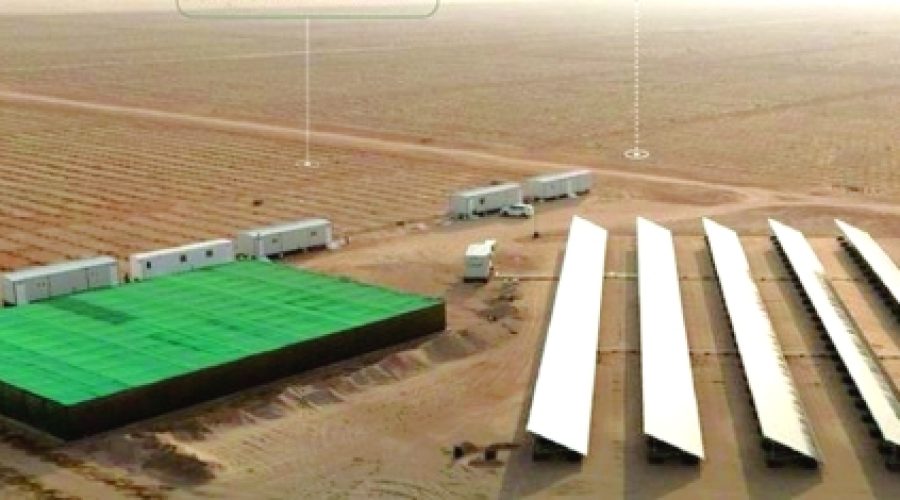پیشرفتها در پروژه جوجوبای هایما: پیامدهایی برای سرمایهگذاری پایدار و رشد کسبوکار در عمان
مسقط، ۹ اکتبر – شرکت توسعه کشاورزی عمان (OADC)، زیرمجموعه شرکت هلدینگ سرمایهگذاری غذایی عمان (Nitaj) که کاملاً دولتی است، ابتکاری پیشگامانه برای کشت درختان جوجوبا در مقیاس وسیع آغاز کرده است. انتظار میرود این پروژه مزایای اقتصادی و زیستمحیطی قابل توجهی داشته باشد و به اهداف ترسیب کربن عمان کمک کند.
شناخته شده به عنوان پروژه ریماهدف این طرح، کاشت ۱۵۰ هزار درخت جوجوبا در زمینی به مساحت ۱.۲ میلیون متر مربع در چشمانداز بیابانی ریما، واقع در ولایت هیما، در محدوده امتیاز بلوک ۶ شرکت توسعه نفت عمان (PDO) است. این پروژه همچنین با وزارت کشاورزی، شیلات و منابع آب و PDO همکاری میکند.
OADC، که قبلاً شرکت توسعه نخیل عمان بود، بر اهمیت این ابتکار تأکید کرد و اظهار داشت: «پروژه ریما با کشت ۱۵۰ هزار درخت جوجوبا در بیش از ۱.۲ میلیون متر مربع زمین خشک، تلاشهای عمان برای ترسیب کربن را پیش میبرد. این پروژه که با سیستم آبیاری خورشیدی کار میکند، الگویی پیشگام از کشاورزی مقاوم در برابر آب و هوا و نوآوری پایدار است.»
کشت جوجوبا فرصتهای تجاری و اقتصادی قابل توجهی را برای عمان، به ویژه در تعهد این کشور به کشاورزی پایدار در بیابان و تنوع بخشیدن به صنعت سبز، فراهم میکند. گیاه جوجوبا (Simmondsia chinensis) که بومی مناطق خشک است، دانههایی را به وفور در موم مایع منحصر به فردی به نام روغن جوجوبا تولید میکند که در بخشهای آرایشی، دارویی و روانکنندههای زیستی تقاضای زیادی دارد. ایجاد مزارع جوجوبا میتواند زنجیرههای ارزش جدیدی را در فرآوری، استخراج روغن و صنایع مرتبط ایجاد کند و در نتیجه اشتغال روستایی ایجاد کرده و از شرکتهای کوچک و متوسط (SME) حمایت کند.
از دیدگاه زیستمحیطی، جوجوبا در شرایط نیمهخشک عمان رشد میکند، به حداقل آب نیاز دارد و به خوبی با خاکهای فقیر سازگار میشود. سیستم ریشه عمیق آن، پایداری خاک را تقویت میکند، بیابانزایی را کاهش میدهد و به ترسیب کربن کمک میکند. گنجاندن جوجوبا در برنامههای سبزسازی یا اعتبار کربن در مقیاس بزرگ، مانند برنامههایی که توسط PDO و سازمان محیط زیست پشتیبانی میشوند، میتواند به عمان در کاهش انتشار گازهای گلخانهای و در عین حال افزایش تنوع زیستی و ترویج شیوههای پایدار زمین کمک بیشتری کند.
برای پشتیبانی از ماهیت متمرکز بر پایداری این پروژه، نفاث رینیوبلز، متخصص انرژی پاک عمانی، برای اجرای یک سیستم آبیاری با انرژی خورشیدی در سراسر سایت استخدام شده است که آنها آن را به عنوان «الگویی پیشگام برای کشاورزی هوشمند و پایدار» توصیف میکنند.
شایان ذکر است که پروژه ریما بخشی از یک مجموعه گستردهتر از ابتکارات کشاورزی و زیستمحیطی در عمان است که با هدف ایجاد اعتبار کربن و تقویت پایداری بلندمدت انجام میشود. یکی از این نمونهها، پروژه کربن آبی عمان، حاصل همکاری بین سازمان محیط زیست و پروژههای سبز MSA است که به دنبال کاشت ۱۰۰ میلیون درخت حرا در زمینی به مساحت تقریبی ۲۰،۰۰۰ هکتار در استان الوسطی است. این ابتکار، تالابهای جزر و مدی و اکوسیستمهای ساحلی را احیا خواهد کرد و به عنوان مناطق حیاتی تنوع زیستی و جاذبهای مؤثر کربن عمل خواهد کرد. این طرح ظرفیت پیشبینیشدهای برای حذف حدود ۱۴ میلیون تن CO₂ و تولید بین ۱.۴ تریلیون و ۱۵۰ میلیون تا ۱.۴ تریلیون و ۱.۶ تریلیون درآمد حاصل از اعتبار کربن تحت استاندارد کربن تأیید شده Verra خواهد داشت.
علاوه بر این، پروژههای ترسیب کربن مبتنی بر طبیعت دیگری نیز توسط بخش خصوصی در حال اجرا هستند. OADC با همکاری PDO، پروژهای را در ظفار برای کشت 30،000 درخت لیموی عمانی آغاز کرده است که جذب کربن را با احیای کشاورزی ادغام میکند. به طور مشابه، اتحاد سبز، که بین سازمان محیط زیست و OPAL ایجاد شده است، چندین نهاد خصوصی را برای پیشبرد تلاشهای جنگلکاری با استفاده از گونههای درختی بومی در مناطق مختلف سلطنت عمان متحد میکند.
تحلیل ویژه از عمانت | بازار عمان را کشف کنید
The معرفی کشت جوجوبا توسط پروژه ریما نشان دهنده یک مقدار قابل توجه است فرصتی برای کسب و کارها در عمان برای بهرهبرداری از کشاورزی پایدار و تنوعبخشی به صنایع سبز، که به طور بالقوه زنجیرههای ارزش جدید و اشتغال روستایی را تقویت میکند. با این حال، تأکید بر ترسیب کربن و پایداری محیط زیست همچنین برای شرکتهایی که با اهداف پایداری همسو نیستند، خطری ایجاد میکند. سرمایهگذاران هوشمند باید در نظر بگیرند قرار دادن خود در طرحهای سازگار با محیط زیست و مشارکتهایی که هم سودآوری و هم نظارت بر محیط زیست را افزایش میدهند.



